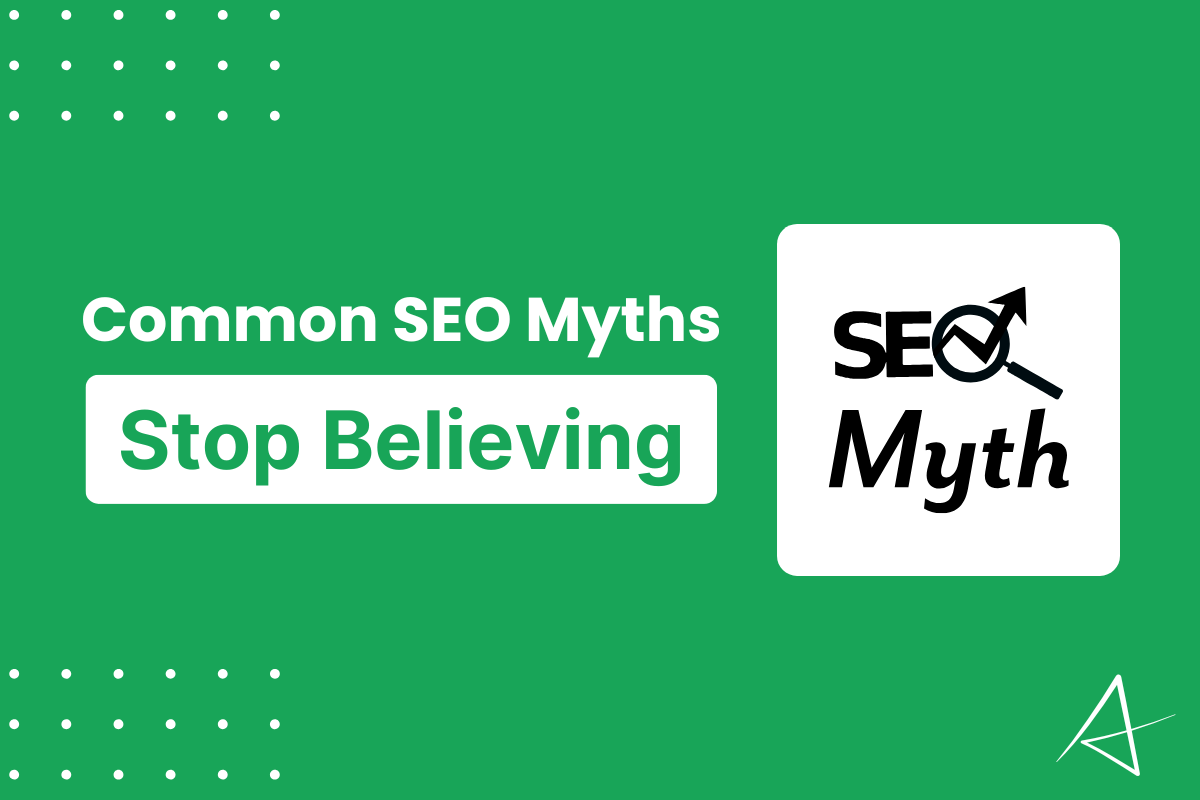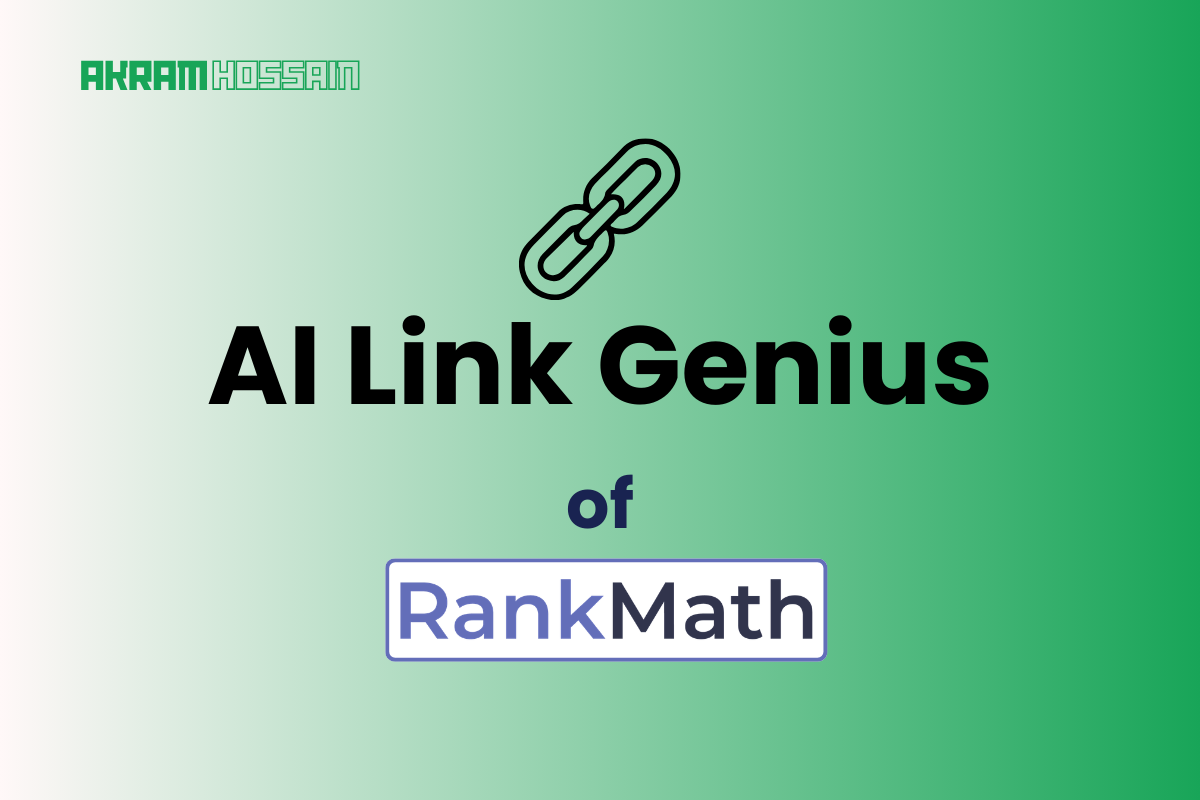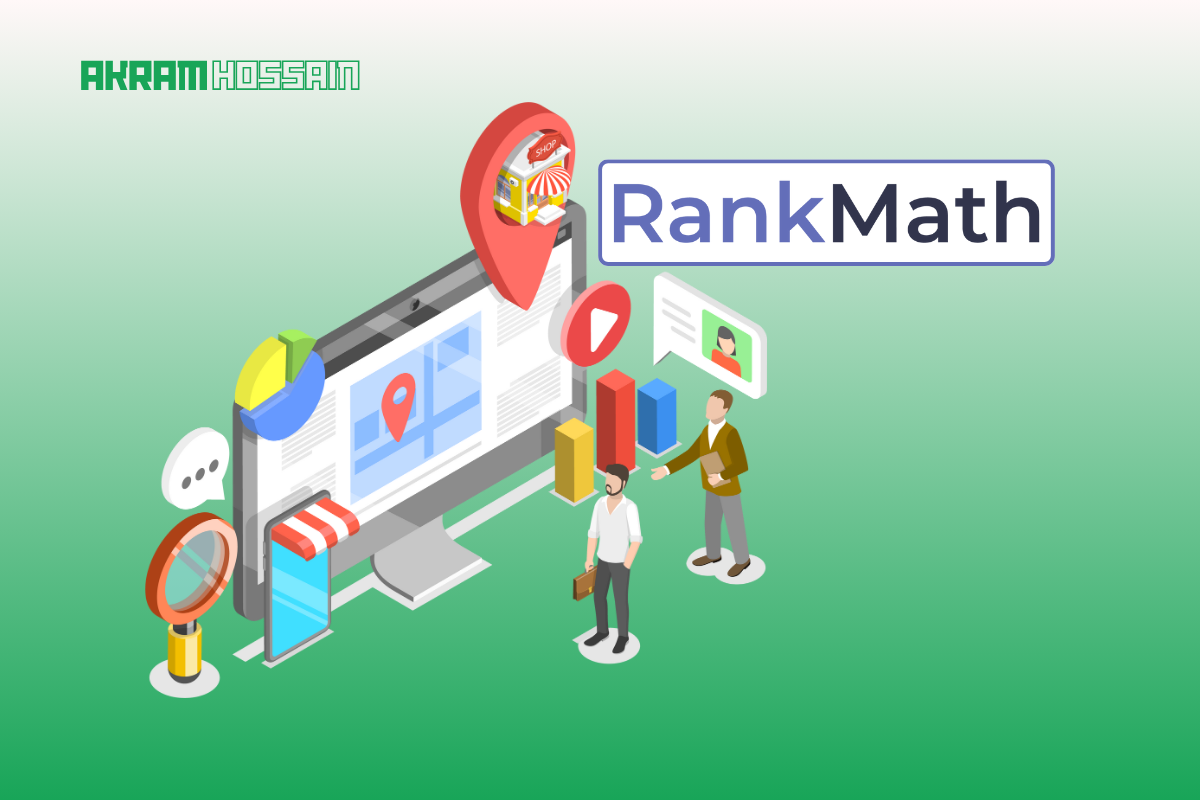LT, DR; (Summary)
SEO is often misunderstood due to persistent myths that misguide marketers. It is not a one-time task but an ongoing process requiring regular updates and content optimization. Keyword stuffing and excessive link-building are outdated practices that can lead to penalties.
Similarly, creating unnecessary pages or relying solely on ads won’t boost organic rankings. Meta tags remain crucial for click-through rates, while duplicate content, though not penalized directly, affects search performance. Social media can indirectly benefit SEO by driving traffic and engagement.
Finally, SEO success isn’t exclusive to big brands; small businesses can excel with quality content and ethical practices. Focus on user satisfaction and evolving strategies to stay ahead in 2025.
Having worked in SEO for over six years, I’ve seen persistent myths misguide businesses, from thinking SEO is a one-time task to believing that keyword stuffing boosts rankings.
As we move into 2025, these misconceptions can hinder growth in an ever-evolving digital space.
In this post, I’ll debunk the top common SEO myths—like “meta tags don’t matter” and “social media has no SEO impact”—while sharing practical insights to help you focus on strategies that deliver results.
Berif of Common SEO Myth in 2025
Common SEO myths can mislead marketers or SEO (search engine optimizer) and hinder website performance. Some popular misconceptions include the belief that keyword stuffing boosts rankings, that social media signals directly impact SEO, or that having more backlinks always equals better rankings.
These are not the end of the myth list; we have discussed 10 common SEO myths that you should stop practicing in your SEO career or journey. Others think SEO is a one-time effort, while it’s an ongoing process.
Let’s ensure your SEO efforts are effective and future-proof.
SEO is a One-Time Task
It’s absolutely not; SEO isn’t a one-time task; it’s a process that you have to pursue gradually and continuously toward your website’s lifetime.
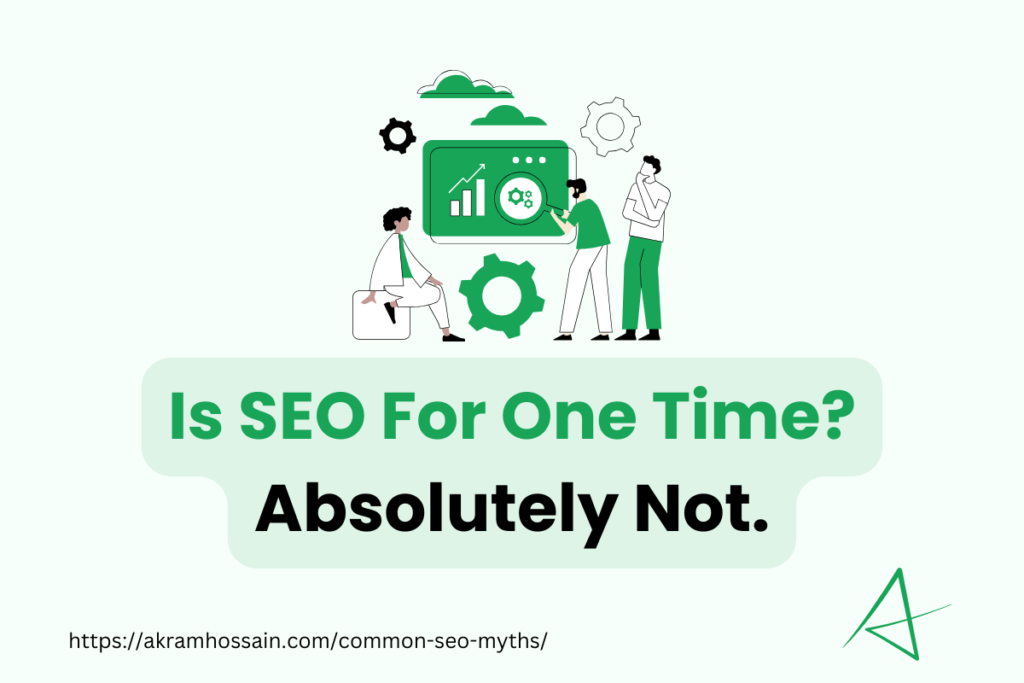
By doing SEO, you will get organic and potential traffic after a certain time, but after completing on-page SEO, Technical SEO, and other SEO aspects. Your job is not done yet.
You have to optimize your website structure and update your content regularly, as well as make sure you are creating unique, accurate content.
Fulfilling user intent with your content will provide an excellent opportunity to get higher traffic with the same effort.
Stay up to date with the Trends
Creating content isn’t just enough to stay on top of the rank; you have to be up to date with the latest updates and trends on that particular topic that you should always focus on.
Updated, fresh, and genuine content always gets rewards for its authenticity; authoritative content builds the reader’s trust, and users convert into customers willingly, which is the goal of a content writer or article publisher.
SEO Is Not a One-Time Task, It’s a Process
To scale up your SEO, you have to adopt the new updates, technology, and the new Google algorithm updates, as well as other search engine algorithms, and know how they are working in the current scenario.
When you are focusing on a long-term result, you can’t stop in the middle of the road; you have to start the engine, and whenever you need to, just press the accelerator.
But don’t stop to completely. Otherwise, someone will overtake your ranks easily, and that’s the concept of SEO. You have to always focus on the process that you have been using from the start of a website.
Keyword Stuffing Improves Rankings
Using a bunch of keywords in your content can’t make your content rank higher; it’s spamming and causes Google penalties.
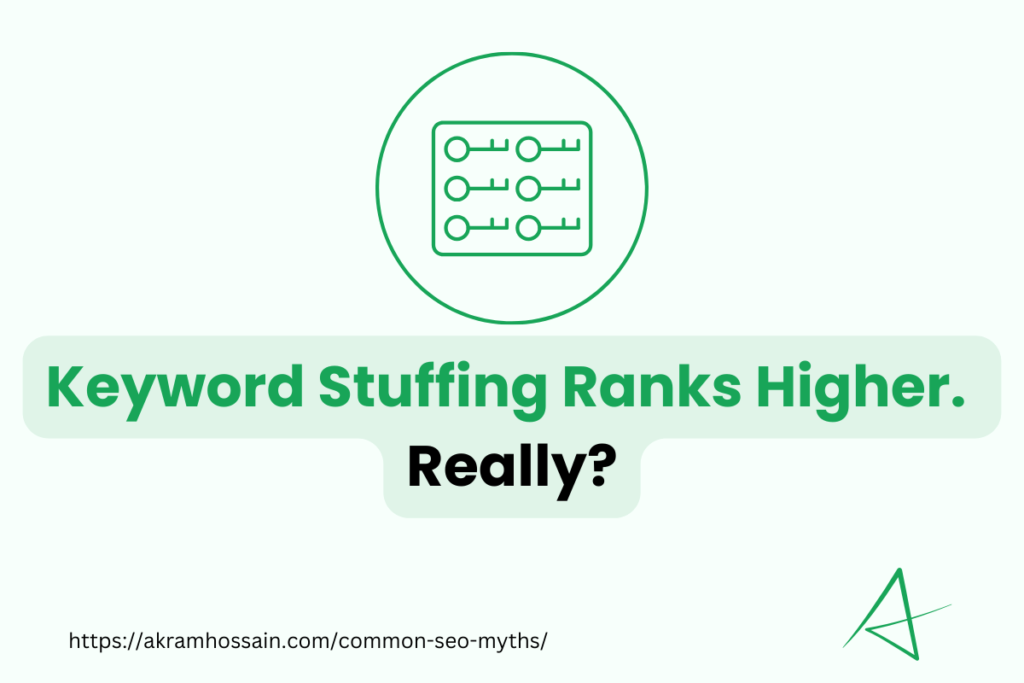
Stuffing keywords means you are inserting your focus keyword into your content forcefully, which is actually not necessary and is not ideal for that particular sentence.
Some WordPress SEO plugins like Yoast SEO and Rank Math even suggest that you use keywords in your content. That’s not a bad practice, but you should follow their recommendation blindly.
Write your content naturally, and try to answer the probable questions of your audience. It will provide a standard value to your audience, who will understand the topic you promised to cover by using your blog heading.
Using so many keywords doesn’t provide any value to your readers, and they do not come to read your keyword after two or three lines.
You have to focus on the topic that you have mentioned in your post title or heading. The topic should be covered in any way with information, and that should be finished by the expertise that you have in that particular topic.
Creating content isn’t just writing a paragraph; it’s a process of providing and sharing your content with your audience, which wants to know about that topic through your own expertise.
⚡ Checkout SEO Services: Best SEO Services For Your Business
Only Link-Building Can Rank Higher
It is not a pure myth in the SEO industry, and there is no doubt that links are a vital ranking factor now. But blindly building links isn’t a way to get a higher organic ranking.
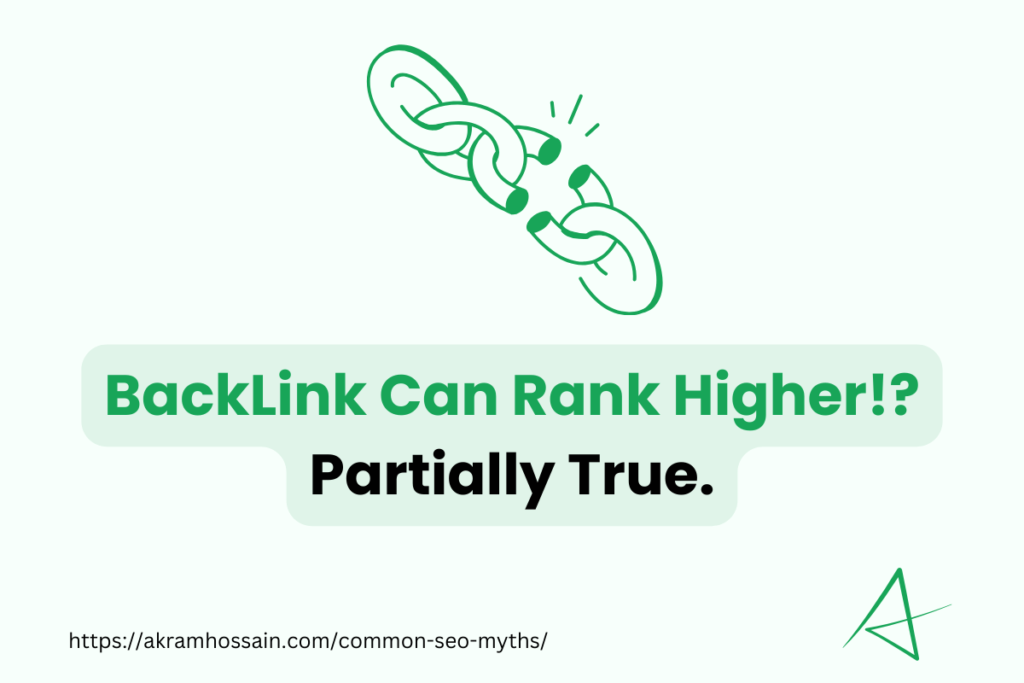
Most of the time, you may even get a penalty for making fake or PBN links using black hat SEO practice.
Link building is a process of your website recommendation that someone wants to give your site a favor that your website’s content is a reference according to their studies.
However, blindly generating backlinks for your website is a spammy and unreal thing from Google’s point of view.
Let’s say you are in the tenth standard class. Would your head teacher give you a recommendation for a CEO position at any company? No way, you need to gain the knowledge to become a CEO, then someone can recommend you for that position.
The same thing goes for your backlinks-building process. You need to have enough content and website authority to get real and natural backlinks for your content.
Natural links are always safe and boost your banking skyrocket; there is no way to get penalties from Google.
The More Pages, the Better the Rankings
That is partially true, but not for all websites where you just create hundreds of web pages and get a higher rank. It’s not just a page number game.
The ranking is an ideal thing that is decided by Google’s algorithms according to your content relevancy, searcher intent, search query, and the overall content quality of your webpage.
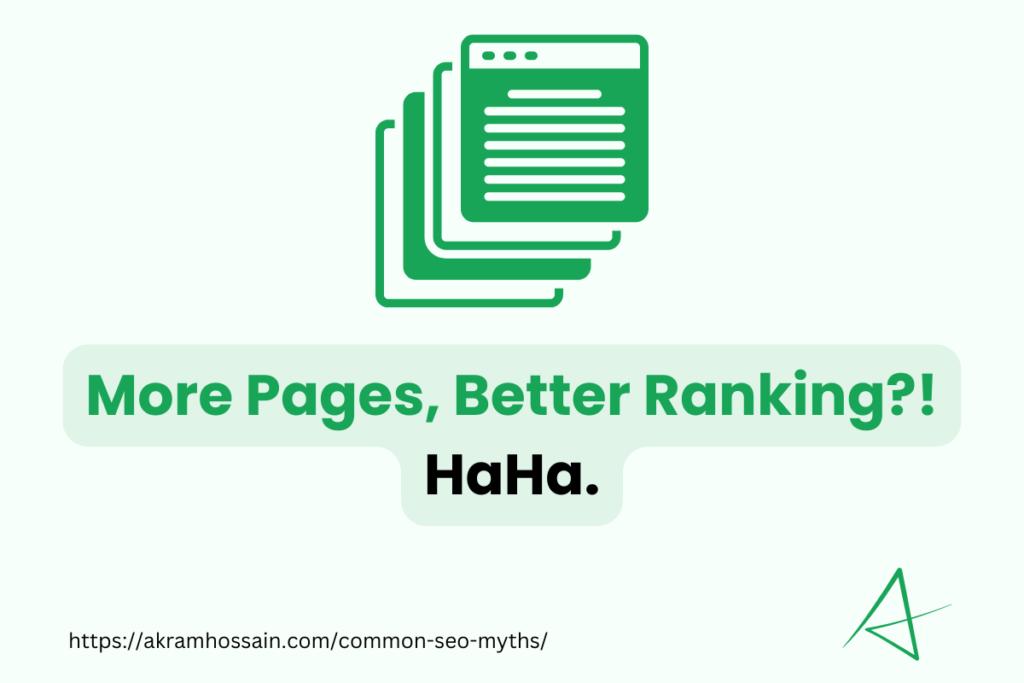
Creating pages isn’t the way to get a higher rank; you have to make your webpage content with the information and ensure that that content fulfills the searcher’s intent.
Try to cover the topic for each webpage, and you are declared in the title of that page. Ensure your content is 100% accurate with the information, facts, and truthfulness.
Creating unwanted pages may cause spamming issues or soft 404 errors for those pages if the page content isn’t qualified for crawling and indexing.
Pages are the branches of your website, but you can’t grow those branches without any valid purpose. Pages should have a purpose and fulfill the purposes of each page.
Otherwise, you may get penalized, or your website may be costly.
Meta Tags Are No Longer Relevant
Currently, I don’t see any documents or Google’s official documentation that says that there is no validation of Meta Tags.
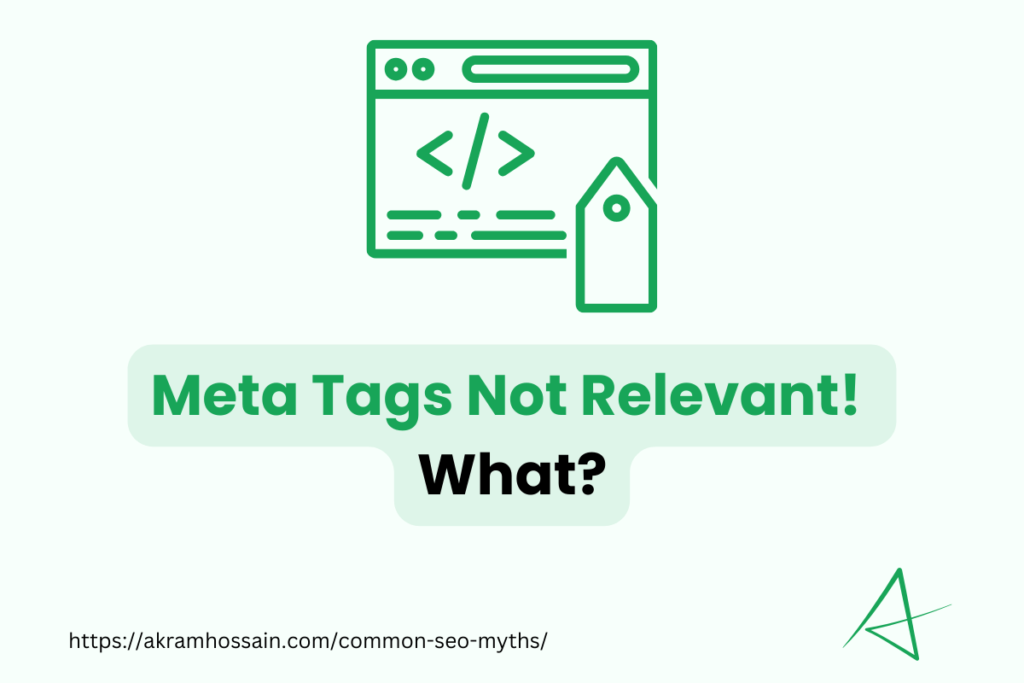
A website’s meta title and meta description are still valid factors for the search engine result page (SERP).
No one can ignore these valid and important metrics for a webpage. You can set a different title tag compared to your original webpage heading.
Also, you have the opportunity to add up to 160 characters of meta descriptions of that particular webpage that will appear in the Search Engine Result Page (SERP).
These two portions of your website are very small, but the impact of those things is vast and can dramatically increase the Click Through Rate (CTR).
Using attractive meta titles and descriptions can bring clicks from the SERP with some actionable words in your title or descriptions.
Even some words can highlight your positions with the optimized and Charmy meta title, and descriptions can capture the searcher’s eye into your content to click on it.
So, Meta Tags are no longer relevant, which is totally a myth.
Paying for Ads Improves Organic Ranking
It’s a haha thing that you are trying to achieve a Soccer final trophy by bucks. It’s not an honest and fair thing. But paying for ads to improve your organic ranking is not exactly like that.
You can read our SEO vs PPC blog to learn more about organic SEO and PPC and better understand this.
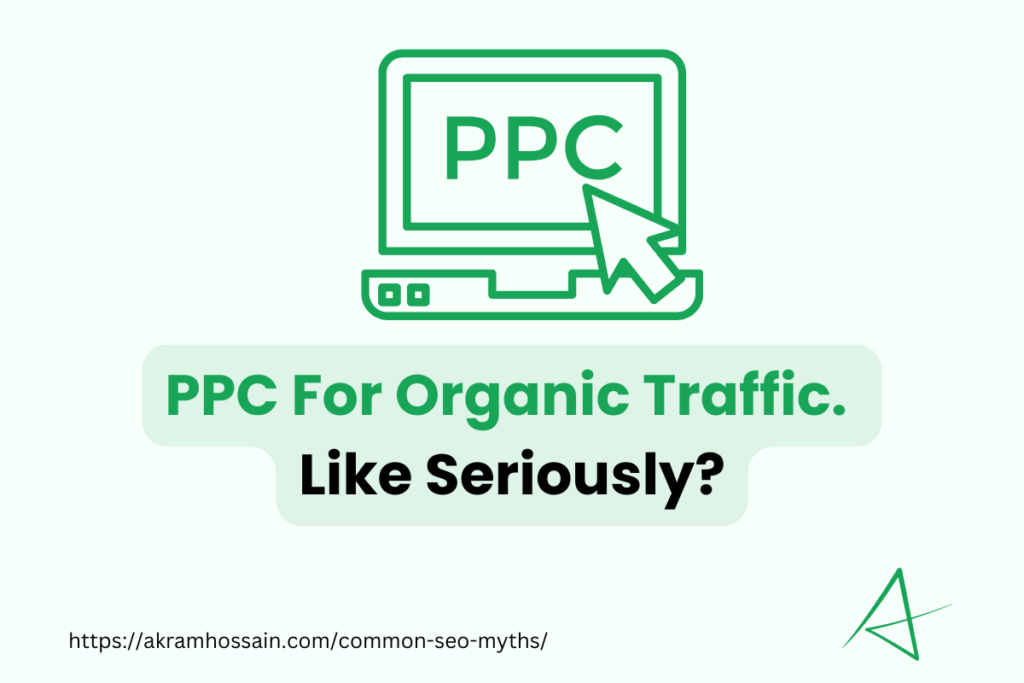
However, conducting an ad campaign is not an ideal practice to boost your website’s organic traffic. Perhaps you can run ads to provide services, sell products, and increase your website’s brand awareness.
But paying for ads to gain organic traffic is totally wrong. After all, you have to create quality content so that Google can give you a higher rank than your competitors, and it’s the real fight of SEO.
I don’t mean that you should run the ads campaign; you can run ads for several purposes. But generating organic traffic by ads will burn your bucks and you won’t get as much as expected traffic from the SERP.
You know, SEO is a continuous thing, and you have to always hanger after it; after a certain period of time, you will get the expected result from the SERP. Which is the main moto of the SEO.
SEO Is Only About Ranking #1 on Google
You won’t get on top rank for all of your web pages, and SEO is not only about ranking #1 on Google Search Engine Result Page (SERP).
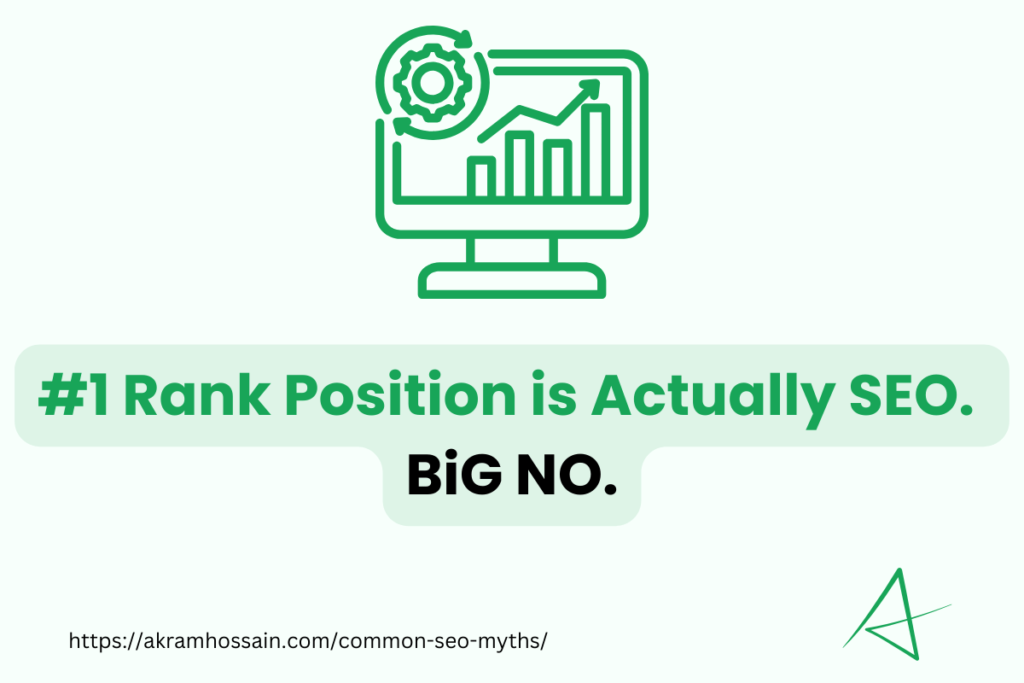
It’s an ups-and-down process, and some of your webpages will get first-page rank, some will get top 1-3 ranks, and some will get beyond the 2 pages of the Google SERP.
Whenever you are writing content on your website, that’s not all. It’s not for the first rank of Google; it’s always focused on the user’s needs, where you are providing the information that helps your users.
Users don’t always come from the search engine, but you have to create content for them and their knowledge base.
#1 ranking is the way to get much traffic, but it’s not the only way to get higher traffic to your website.
When you provide the content value to the readers, it can be the FAQs, documentation of your products, tutorials, PDFs, and many more for them. And all of those will not get the rank on Google or search engines.
Always think beyond your first rank marathon; it’s all about your user satisfaction with your website, services, or products.
Social Media Doesn’t Impact SEO
The relationship between social media and website SEO is a nuanced topic. Some SEO experts argue that social media has no direct impact on SEO, while others leverage social media to drive traffic to their websites.
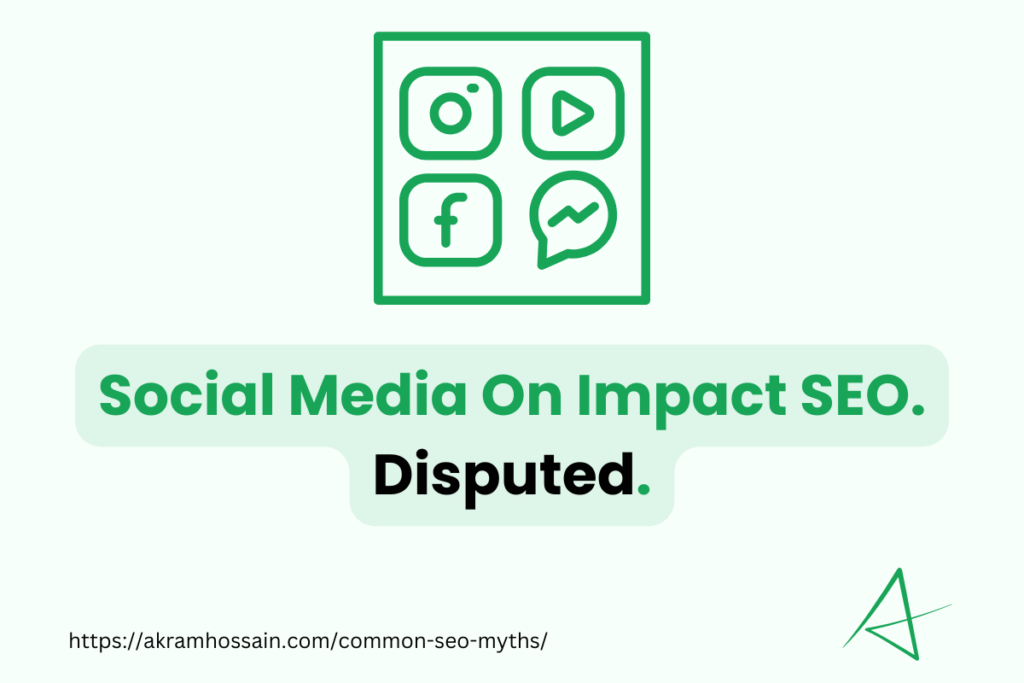
Ultimately, the goal of SEO is to generate traffic, and creating social media content that drives visitors to your site can be a strategic move. According to prominent SEO experts, social media traffic and organic search traffic are fundamentally different. However, both types of traffic can provide value to your content as users engage with your blog or articles.
That said, the intent behind social media traffic differs from that of organic search traffic, which is a crucial distinction. Based on my experience, social media traffic is generally less potent than organic search traffic. However, depending on your website’s niche, product, or services, some of this social traffic can still convert into customers.
The effectiveness of social media traffic ultimately depends on various factors, including user intent, website content, and the overall marketing strategy for your campaign.
Duplicate Content Leads to Penalties
First, you need to understand that duplicate content doesn’t mean it’s fake or false. So, there is no sense that you will get penalized for the duplicate content.
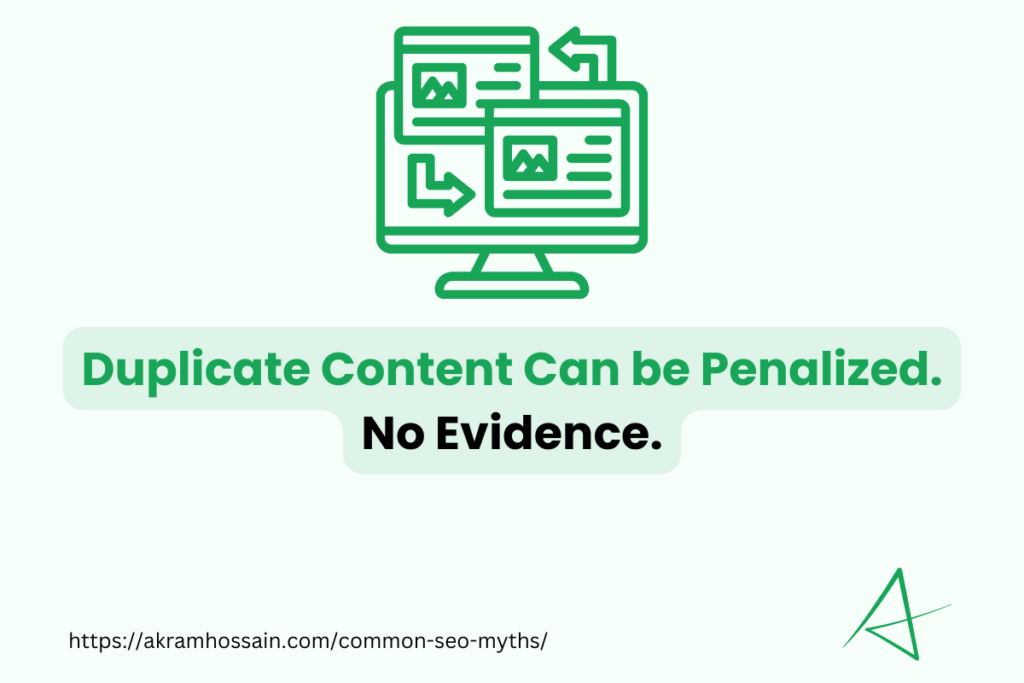
Let’s understand the duplicate content first;
What is Duplicate Content?
Duplicate content is thin or particular content with multiple copies online available on different websites, and you just rewrite the paragraph and publish it on your own website. Basically, duplicate content doesn’t provide new value to the readers, and these are already found somewhere on the internet.
Does Duplicate Content Lead To a Penalty?
Google doesn’t officially penalize websites for duplicate content, but it does impact your site’s performance. Duplicate content can hinder crawling, indexing, and ranking in search results. While there’s no direct penalty, relying on duplicate content could result in low-quality content issues, potentially triggering Google’s low-content policy—a significant problem for any website.
To avoid these issues, focus on creating original, high-value content that engages your audience and meets their needs.
Only Big Brands Can Succeed with SEO
It’s totally a misconception about SEO. SEO isn’t only for a big fish; you have the opportunity to get a higher rank with different topics and different keywords.
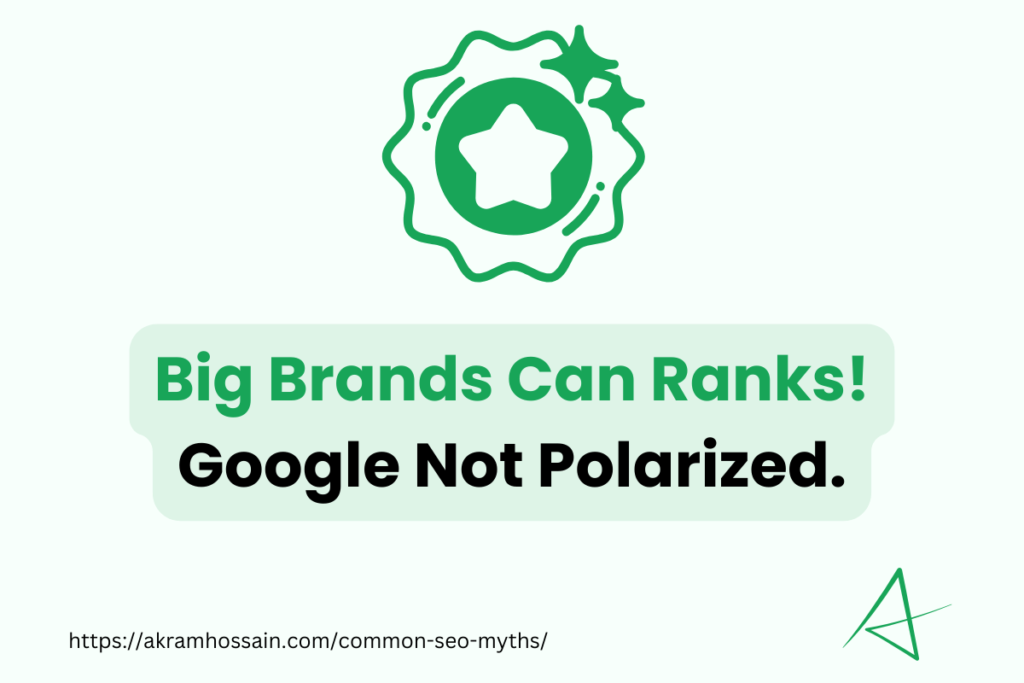
You have to adopt the strategy and Google algorithm that how it’s going in the current era; just focus on the goal and start practicing the Good and White Hat SEO.
Google has no nepotism in that they only rank the big brands on top of the SERP; if you can provide quality content that is actually helpful to your readers and fulfills their intent of what they are actually looking for, then Google will definitely give you the rank for sure.
Remember that every big brand was small once, so don’t lose hope; you will grow big in the next few years if you are consistent in your field.
No brand or website can guarantee the first position rank with their domain authority or bulk number of web pages. All depend on the Google algorithm and the strategy of their content.
